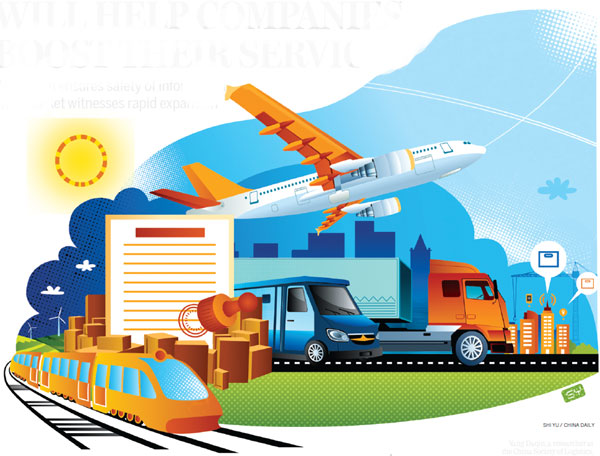Regulation ensures safety of information after market witnesses rapid expansion
Eleven hours, 100 parcels, eight neighboring communities. That's Liu Zili's daily task. His main concern though is not the arduous work but his disappointment that no one seems to trust the deliveryman, though he knows almost everyone in these communities.
During the past seven years, the 43-year-old deliveryman has tried to forge a closer connection with his clients. However, he never truly succeeded because clients were inclined to avoid any personal contact due to scandals and mishaps such as lost parcels and disclosure of personal information.
Liu is well known on the streets but still feels like a stranger in the capital city. His clients' reluctance to get to know him better was perhaps understandable but Liu was disheartened. He said many of his fellow workers share his sentiment.
Recent years have seen a rapid expansion of the express delivery market, demanding further regulation to keep consumers and the sector safer.
A draft regulation on express delivery was approved in principle at a State Council executive meeting, which was presided over by Premier Li Keqiang on Wednesday.
Measures will be introduced to simplify procedures for companies to set up new branches and park vehicles, both aiming to reduce the cost of logistics. The new draft stipulates service rules and safety requirements for express delivery companies, stressing on protecting the legitimate rights of consumers as well as express deliverymen. Meanwhile, the draft also sets rules for compensation and information protection.
Further details are still unknown until the draft is released for discussions. It came after the first draft of a document was released by the State Council Legal Affairs Office in November 2015 to solicit opinions, which focused on key areas; infrastructure, safety concerns and personal information security.
The first half of this year saw 17.4 billion express delivery parcels delivered, up by 31 percent compared to the same period last year, the State Post Bureau said last week. The sector achieved revenue of 218 billion yuan ($32.1 billion), which increased by 27 percent. As of this month, more than 21,000 companies were running 189,000 branches across the country with more than 2 million employees.
However, consumers still find cause for complaint with 1.3 million submitted to the National Post Consumer Complaint Center in 2016. More than 28 percent of complaints were filed over delayed delivery and another 20 percent over parcels lost on the way to receivers. In this sense, the express delivery sector needs more sophisticated regulation.
Express delivery has spread from cities to larger areas in rural communities. As the country promotes the Internet Plus Initiative, a strategy to integrate traditional industries with online services, more parcels have been transported from farmers to the tables of urban residents.
During this process, the number of branches and collection sites has surged, said Xu Yong, chief consultant of the online logistics consultancy cecss.com. Therefore, one certificate required for one company will make it easier to set up branches and will reduce institutional cost for express delivery companies, he said.
The deliveryman Liu said most deliverymen are hardworking and resolute in protecting clients' information. However, some scandals have hurt the image of express delivery companies and stricter management is urgently needed.
Yang Daqin, a researcher at the China Society of Logistics, said the express delivery sector is changing into a comprehensive logistics industry to provide diversified services. The draft should encompass logistics services provided by internet companies, he said.
Express delivery companies possess a huge amount of personal information, including names, addresses and mobile phone numbers. Systematic risks should be managed to avoid any further disclosure of personal information and any illegal conduct related to personal safety, Yang added.
The premier said during Wednesday's meeting that the emerging sector of express delivery can facilitate people's lives and reduce logistics costs, which is also beneficial to spur consumption and economic growth.
"Relevant departments should listen to opinions from all parties concerned with in-depth research, making the new draft a boost to healthy development of the sector and ensure legal rights of consumers and deliverymen," the premier added.

